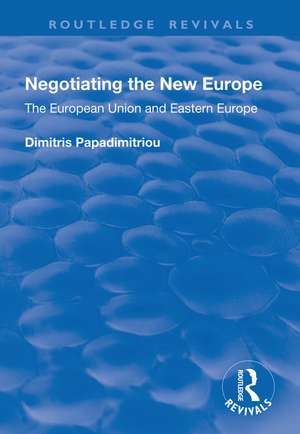Negotiating the New Europe: The European Union and Eastern Europe: Routledge Revivals
Autor Dimitris Papadimitriouen Limba Engleză Hardback – 28 noi 2017
| Toate formatele și edițiile | Preț | Express |
|---|---|---|
| Paperback (1) | 215.40 lei 6-8 săpt. | |
| Taylor & Francis – 11 noi 2019 | 215.40 lei 6-8 săpt. | |
| Hardback (1) | 459.00 lei 6-8 săpt. | |
| Taylor & Francis – 28 noi 2017 | 459.00 lei 6-8 săpt. |
Din seria Routledge Revivals
- 9%
 Preț: 801.71 lei
Preț: 801.71 lei - 8%
 Preț: 432.64 lei
Preț: 432.64 lei -
 Preț: 168.89 lei
Preț: 168.89 lei -
 Preț: 245.88 lei
Preț: 245.88 lei -
 Preț: 309.79 lei
Preț: 309.79 lei -
 Preț: 258.73 lei
Preț: 258.73 lei - 9%
 Preț: 764.35 lei
Preț: 764.35 lei - 9%
 Preț: 903.42 lei
Preț: 903.42 lei -
 Preț: 311.18 lei
Preț: 311.18 lei -
 Preț: 357.45 lei
Preț: 357.45 lei - 9%
 Preț: 626.93 lei
Preț: 626.93 lei -
 Preț: 317.54 lei
Preț: 317.54 lei - 9%
 Preț: 764.30 lei
Preț: 764.30 lei -
 Preț: 257.01 lei
Preț: 257.01 lei -
 Preț: 238.40 lei
Preț: 238.40 lei -
 Preț: 259.48 lei
Preț: 259.48 lei - 9%
 Preț: 938.10 lei
Preț: 938.10 lei -
 Preț: 341.33 lei
Preț: 341.33 lei -
 Preț: 264.10 lei
Preț: 264.10 lei -
 Preț: 294.98 lei
Preț: 294.98 lei -
 Preț: 308.89 lei
Preț: 308.89 lei -
 Preț: 207.40 lei
Preț: 207.40 lei -
 Preț: 347.50 lei
Preț: 347.50 lei -
 Preț: 302.59 lei
Preț: 302.59 lei -
 Preț: 389.40 lei
Preț: 389.40 lei -
 Preț: 257.01 lei
Preț: 257.01 lei -
 Preț: 358.30 lei
Preț: 358.30 lei - 9%
 Preț: 640.91 lei
Preț: 640.91 lei - 9%
 Preț: 619.49 lei
Preț: 619.49 lei -
 Preț: 228.88 lei
Preț: 228.88 lei -
 Preț: 265.16 lei
Preț: 265.16 lei -
 Preț: 257.90 lei
Preț: 257.90 lei -
 Preț: 266.06 lei
Preț: 266.06 lei -
 Preț: 258.73 lei
Preț: 258.73 lei -
 Preț: 384.01 lei
Preț: 384.01 lei -
 Preț: 246.38 lei
Preț: 246.38 lei - 9%
 Preț: 832.08 lei
Preț: 832.08 lei -
 Preț: 266.20 lei
Preț: 266.20 lei -
 Preț: 294.53 lei
Preț: 294.53 lei - 18%
 Preț: 695.86 lei
Preț: 695.86 lei - 9%
 Preț: 934.96 lei
Preț: 934.96 lei - 5%
 Preț: 243.38 lei
Preț: 243.38 lei -
 Preț: 274.69 lei
Preț: 274.69 lei -
 Preț: 208.20 lei
Preț: 208.20 lei - 9%
 Preț: 659.19 lei
Preț: 659.19 lei -
 Preț: 259.69 lei
Preț: 259.69 lei - 9%
 Preț: 1038.47 lei
Preț: 1038.47 lei -
 Preț: 389.46 lei
Preț: 389.46 lei -
 Preț: 302.14 lei
Preț: 302.14 lei -
 Preț: 302.27 lei
Preț: 302.27 lei
Preț: 459.00 lei
Preț vechi: 614.21 lei
-25% Nou
Puncte Express: 689
Preț estimativ în valută:
87.83€ • 95.70$ • 74.01£
87.83€ • 95.70$ • 74.01£
Carte tipărită la comandă
Livrare economică 23 aprilie-07 mai
Preluare comenzi: 021 569.72.76
Specificații
ISBN-13: 9781138738126
ISBN-10: 1138738123
Pagini: 228
Dimensiuni: 150 x 216 mm
Greutate: 0.58 kg
Ediția:1
Editura: Taylor & Francis
Colecția Routledge
Seria Routledge Revivals
Locul publicării:Oxford, United Kingdom
ISBN-10: 1138738123
Pagini: 228
Dimensiuni: 150 x 216 mm
Greutate: 0.58 kg
Ediția:1
Editura: Taylor & Francis
Colecția Routledge
Seria Routledge Revivals
Locul publicării:Oxford, United Kingdom
Cuprins
Contents: Introduction. The Negotiation of the First Wave of Europe Agreements: Putting the association agreements into theoretical perspective; The EC and the first wave of association agreements: fixing the rules of the game; Explaining the outcome of the first wave of association agreements: games in multiple arenas with variable payoffs. The Negotiation of the Second Wave of Europe Agreements: Bulgarian and Romanian attempts to enter the association game: the response of the EC's member states; Relegation confirmed: the response of the EC's institutions to the Bulgarian and Romanian attempts to enter the association game; Explaining the outcome of the second wave of association agreements: the effects of bargaining in an iterated game. The Europe Agreements, Eastwards Enlargement and the EU's Strategy in the Balkans: The legacy of the Europe agreements: continuity and change in the EU's relations with central and Eastern Europe and the Balkans; Bibliography; Index.
Recenzii
’...informed and cogently argued...a study of Association agreements as key part of the EU’s Balkan policy mosaic.’ Loukas Tsoukalis, Professor, University of Athens / President, Hellenic Foundation for European and Foreign Policy (ELIAMEP) ’A stimulating read for anyone interested in EU external relations, this book draws on game theory to provide a lucid and persuasive account of the negotiations which led to the conclusion of Europe Agreements between the European Community and countries of Central and Eastern Europe in the first half of the 1990s. As such, the book makes a strong case for adopting a soft rational choice perspective when seeking to understand the dynamics of EU external relations.’ Dr David Phinnemore, Queen’s University Belfast, Northern Ireland ’...a stimulating book that provides an informed and empirically rich analysis of the evolution of the EU’s policy towards Central and Eastern Europe after 1989.’ Political Studies Review ’...an informed, well-researched narrative of the evolution of Europe Agreements during the early 1990s...a useful contribution to understanding the process of enlarging the European Union.’ Slavic Review 'Negotiating the New Europe neatly summarisees what is known from earlier research on the different goals and strategies of individual EC members, especially France, Germany and the UK, and of the Visegrád three. In addition, the book adds a perspective from the Mediterranean - Greece, Italy, Portugal and Spain - and from the Balkans - Greece again and Yugoslavia before and after its dissolution.' The European Legacy
Descriere
This title was first published in 2002: This new and challenging perspective on how the European Union (EU) sought to structure its relations with Central and Southeast Europe in the new conditions of the post-Cold War world draws upon key debates in both politics and international relations. Historically and theoretically informed, the book will appeal to academics, students and practitioners alike.
